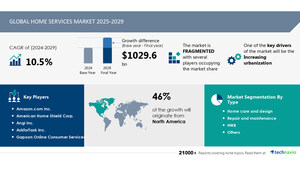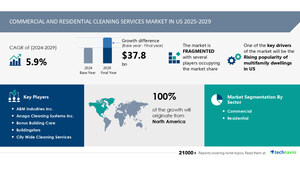NEW YORK, Sept. 13, 2024 /PRNewswire/ -- Report on how AI is redefining market landscape- The global clinical chemistry analyzers market size is estimated to grow by USD 3.33 billion from 2024-2028, according to Technavio. The market is estimated to grow at a CAGR of 4.4% during the forecast period. Increase in new launches of clinical chemistry analyzers by market vendors is driving market growth, with a trend towards rise in adoption of automated clinical chemistry analyzers. However, high initial and maintenance cost of clinical chemistry analyzers poses a challenge. Key market players include Abbott Laboratories, Arkray USA Inc., Balio Diagnostics, Bio Rad Laboratories Inc., Cardinal Health Inc., Chengdu Seamaty Technology Co. Ltd., Danaher Corp., DiaSorin SpA, Dirui Industrial Co. Ltd, Erba Group, F. Hoffmann La Roche Ltd., Hitachi Ltd., HORIBA Ltd., Maccura Biotechnology Co. Ltd, Meril Life Sciences Pvt. Ltd., Randox Laboratories Ltd., Shenzhen Mindray BioMedical Electronics Co. Ltd, Siemens AG, Sysmex Corp., Thermo Fisher Scientific Inc., and Werfenlife SA.
AI-Powered Market Evolution Insights. Our comprehensive market report ready with the latest trends, growth opportunities, and strategic analysis- View your snapshot now
Forecast period |
2024-2028 |
Base Year |
2023 |
Historic Data |
2018 - 2022 |
Segment Covered |
End-user (Hospitals, Diagnostic laboratories, Academic research centers, and Others), Type (Fully automated clinical chemical analyzers and Semi automated clinical chemical analyzers), and Geography (North America, Europe, Asia, and Rest of World (ROW)) |
Region Covered |
North America, Europe, Asia, and Rest of World (ROW) |
Key companies profiled |
Abbott Laboratories, Arkray USA Inc., Balio Diagnostics, Bio Rad Laboratories Inc., Cardinal Health Inc., Chengdu Seamaty Technology Co. Ltd., Danaher Corp., DiaSorin SpA, Dirui Industrial Co. Ltd, Erba Group, F. Hoffmann La Roche Ltd., Hitachi Ltd., HORIBA Ltd., Maccura Biotechnology Co. Ltd, Meril Life Sciences Pvt. Ltd., Randox Laboratories Ltd., Shenzhen Mindray BioMedical Electronics Co. Ltd, Siemens AG, Sysmex Corp., Thermo Fisher Scientific Inc., and Werfenlife SA |
Key Market Trends Fueling Growth
The clinical chemistry analyzers market is witnessing significant growth due to the increasing adoption of automated systems. Automated clinical chemistry analyzers offer benefits such as increased efficiency, enhanced accuracy, improved turnaround times, and reduced manpower requirements. The demand for high-throughput and standardized testing solutions in clinical settings is driving this trend. Automated analyzers can process large volumes of samples quickly and consistently, enabling healthcare facilities to manage high caseloads efficiently while maintaining quality standards. They also help reduce the risk of human error and variability in test results, promoting greater accuracy and reliability in diagnostic testing. Vendors are expanding their portfolio in automated clinical chemistry analyzers with new offerings. For instance, HORIBA Ltd.'s next-generation HELO system simplifies laboratory testing and enhances workflow efficiency. Roche Diagnostics' new analytical units for its Cobas Pro Integrated Solutions combine chemistry and immunology testing capabilities in a single system, enhancing laboratory efficiency and workflow. These advancements streamline testing processes, reduce sample preparation requirements, and improve patient outcomes. Automation in clinical chemistry analyzers also enhances laboratory productivity and workflow efficiency, allowing healthcare facilities to optimize resource utilization and improve overall operational performance. Continuous processing of samples, real-time data tracking, and rapid reporting of results are essential for timely decision-making by healthcare providers and improved patient outcomes. The ability to streamline laboratory processes and reduce turnaround times through automation translates into enhanced patient care experiences and increased healthcare provider satisfaction. Overall, the increasing adoption of automated clinical chemistry analyzers will positively impact market growth during the forecast period.
The Clinical Chemistry Analyzers market is thriving in Laboratory Medicine, offering solutions for pre-analytical, analytical, and post-analytical variables. These analyzers determine essential parameters like Albumin, Lactate Dehydrogenase (LD), Alanine Aminotransferase (ALT), and Aspartate Aminotransferase (AST) in blood samples, plasma, urine, and cerebrospinal fluid. Companies like EKF Diagnostics provide pure integrated solutions with digital connectivity for early diagnostics, especially crucial in cancer cases and toxicology labs. Advanced modeling, parameter estimation, computer-assisted interpretation, and artificial intelligence (AI) are driving trends in this sector. Automated analyzers ensure real-time automation, parameter monitoring, and variable adjustment, especially beneficial in intensive care units. Specialized diagnosis areas, such as Oncology, Gynecology, and Endocrinology, significantly contribute to the market growth.
Insights on how AI is driving innovation, efficiency, and market growth- Request Sample!
Market Challenges
- The global clinical chemistry analyzers market faces challenges due to the high initial and maintenance costs. These expenses pose financial barriers for healthcare providers, diagnostic laboratories, and healthcare systems. The cost of clinical chemistry analyzers can range from USD5,000 to USD100,000, and annual maintenance costs can range from USD1,000 to USD5,000, with consumables accounting for a significant portion. High-end models with advanced features have higher costs, making it difficult for smaller healthcare facilities and resource-constrained settings to acquire and deploy these analyzers. Ongoing maintenance and service expenses add to the overall cost burden, potentially impacting operational budgets and limiting the utilization of clinical chemistry analyzers. These factors may hinder the growth of the clinical chemistry analyzers market during the forecast period.
- The Clinical Chemistry Analyzers market faces several challenges in various healthcare segments. In outpatient clinics, emergency wards, and surgical wards, there's a growing demand for quick and accurate results. Physician preference and reagent rental agreements impact cost-per-test, making Point-of-Care testing and biosensors attractive alternatives. In hospitals and diagnostic laboratories, automated chemistry analyzers are essential for managing chronic diseases like hypertension, diabetes, cardiovascular diseases, liver disorders, and kidney disorders. Lifestyle-induced diseases and newborn screening increase the need for clinical chemistry analyzers. The geriatric and elderly population require regular monitoring for age-related ailments. Preventive medicine and skilled laboratory technicians are crucial for small laboratories and healthcare facilities. However, there's a shortage of laboratory technicians, which affects the efficiency of chronic condition management in the healthcare system. Outpatient treatments, viral transmission risks, and chronic therapies necessitate continuous monitoring through clinical chemistry tests, serological tests, and diagnostic tools.
Insights into how AI is reshaping industries and driving growth- Download a Sample Report
Segment Overview
This clinical chemistry analyzers market report extensively covers market segmentation by
- End-user
- 1.1 Hospitals
- 1.2 Diagnostic laboratories
- 1.3 Academic research centers
- 1.4 Others
- Type
- 2.1 Fully automated clinical chemical analyzers
- 2.2 Semi automated clinical chemical analyzers
- Geography
- 3.1 North America
- 3.2 Europe
- 3.3 Asia
- 3.4 Rest of World (ROW)
1.1 Hospitals- The Clinical Chemistry Analyzers market is experiencing significant growth due to the increasing demand for automated and accurate diagnostic tools in healthcare facilities. These analyzers help in detecting various health conditions by measuring the levels of different chemicals in body fluids. Major players in this market include Roche Diagnostics, Abbott Laboratories, and Siemens Healthineers, who invest heavily in research and development to introduce innovative products. The market is expected to continue its expansion due to the rising prevalence of chronic diseases and the growing awareness about early disease detection.
Download complimentary Sample Report to gain insights into AI's impact on market dynamics, emerging trends, and future opportunities- including forecast (2024-2028) and historic data (2018 - 2022)
Research Analysis
Clinical chemistry analyzers are essential diagnostic tools in healthcare systems, used for the quantitative analysis of various biochemical components in body fluids, such as blood, urine, and cerebrospinal fluid. These analyzers play a crucial role in early disease detection and specialized diagnosis, particularly in fields like oncology, gynecology, and endocrinology. Advanced modeling, parameter estimation, computer-assisted interpretation, and artificial intelligence (AI) are increasingly being integrated into clinical chemistry analyzers to enhance accuracy and efficiency. Automated analyzers with real-time automation facilitate quick and reliable results, making them indispensable for managing age-related ailments, such as hypertension, diabetes, cardiovascular diseases, liver disorders, and kidney disorders. The elderly population, with its increased susceptibility to chronic therapies and viral transmission, particularly benefits from these advanced diagnostic tools. Clinical chemistry tests, including basic metabolic panels, lipid profiles, liver panels, and renal panels, are integral components of outpatient treatments and contribute significantly to the overall healthcare system.
Market Research Overview
Clinical chemistry analyzers are essential diagnostic tools used in various healthcare settings for the detection and diagnosis of various diseases. These analyzers play a crucial role in early disease identification and specialized diagnosis, particularly in areas such as oncology, gynecology, endocrinology, and other chronic diseases. Advanced modeling and parameter estimation are key features of modern clinical chemistry analyzers, which utilize computer-assisted interpretation and artificial intelligence (AI) for accurate results. Automated analyzers offer real-time automation, parameter monitoring, and variable adjustment, making them ideal for intensive care units, outpatient clinics, and emergency wards. Clinical chemistry products are used extensively in hospitals, diagnostic laboratories, and healthcare facilities to monitor health and manage chronic conditions. The geriatric population and elderly population are significant users of these analyzers due to age-related ailments such as hypertension, diabetes, cardiovascular diseases, liver disorders, and kidney disorders. Preventive medicine and skilled laboratory technicians are essential for effective use of these diagnostic tools. Clinical chemistry analyzers offer a range of tests, including basic metabolic panels, lipid profiles, liver panels, and renal panels. Blood samples, plasma, urine, and cerebrospinal fluid can be analyzed using these analyzers. Point-of-care testing and biosensors are alternative solutions for smaller healthcare facilities and outpatient treatments. The healthcare system faces a shortage of laboratory technicians, leading to increased demand for automated analyzers and in vitro diagnostics. Cost-per-test, reagent rental agreements, and digital connectivity solutions are crucial factors in the selection of clinical chemistry analyzers. Lifestyle-induced diseases, newborn screening, and toxicology labs are other applications of these analyzers. Overall, clinical chemistry analyzers play a vital role in monitoring health and improving patient outcomes.
Table of Contents:
1 Executive Summary
2 Market Landscape
3 Market Sizing
4 Historic Market Size
5 Five Forces Analysis
6 Market Segmentation
- End-user
- Hospitals
- Diagnostic Laboratories
- Academic Research Centers
- Others
- Type
- Fully Automated Clinical Chemical Analyzers
- Semi Automated Clinical Chemical Analyzers
- Geography
- North America
- Europe
- Asia
- Rest Of World (ROW)
7 Customer Landscape
8 Geographic Landscape
9 Drivers, Challenges, and Trends
10 Company Landscape
11 Company Analysis
12 Appendix
About Technavio
Technavio is a leading global technology research and advisory company. Their research and analysis focuses on emerging market trends and provides actionable insights to help businesses identify market opportunities and develop effective strategies to optimize their market positions.
With over 500 specialized analysts, Technavio's report library consists of more than 17,000 reports and counting, covering 800 technologies, spanning across 50 countries. Their client base consists of enterprises of all sizes, including more than 100 Fortune 500 companies. This growing client base relies on Technavio's comprehensive coverage, extensive research, and actionable market insights to identify opportunities in existing and potential markets and assess their competitive positions within changing market scenarios.
Contacts
Technavio Research
Jesse Maida
Media & Marketing Executive
US: +1 844 364 1100
UK: +44 203 893 3200
Email: [email protected]
Website: www.technavio.com/
SOURCE Technavio

WANT YOUR COMPANY'S NEWS FEATURED ON PRNEWSWIRE.COM?
Newsrooms &
Influencers
Digital Media
Outlets
Journalists
Opted In






Share this article